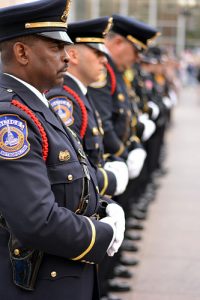The Deep Blue Line
On a swel tering September Sunday night two weeks ago, a cop sat at the head of the gurney inside a shrieking ambulance as it raced through the projects and slums toward Sutter Medical Center. The cop, a ten-year veteran of patrol, held the broken parts of a man’s skull in her two hands — like trying to keep the yolk from seeping through two halves of a cracked egg. It was a ten-minute dash to the hospital, twenty since he was shot through the right jaw at point blank range and now the man’s brain was swelling rapidly, pushing through the skull fissures and his nostrils and his eye socket. He struggled mightily to speak but there was just too much brain damage for that. Still, his one good eye was open and it was telling the only person left in his world about his fear and panic and the realization that he would never see another morning.
tering September Sunday night two weeks ago, a cop sat at the head of the gurney inside a shrieking ambulance as it raced through the projects and slums toward Sutter Medical Center. The cop, a ten-year veteran of patrol, held the broken parts of a man’s skull in her two hands — like trying to keep the yolk from seeping through two halves of a cracked egg. It was a ten-minute dash to the hospital, twenty since he was shot through the right jaw at point blank range and now the man’s brain was swelling rapidly, pushing through the skull fissures and his nostrils and his eye socket. He struggled mightily to speak but there was just too much brain damage for that. Still, his one good eye was open and it was telling the only person left in his world about his fear and panic and the realization that he would never see another morning.
The cop didn’t shoot the man, somebody in the neighborhood did. It was a sudden, violent argument over a dog. Two other men — one went for a gun. The victim was the one trying to break it up. The shooter got him in a headlock, put the weapon to his skull and blew half his brains out. Over a barking dog. Sacramento on a sultry Sunday night. Cops answer these kinds of calls all the time. In Chicago somebody gets shot every two hours. And it’s rarely a police officer doing the shooting. Who picks up the pieces? Always somebody in blue. Do we ever hear about the unholy carnage that brave men and women deal with on every shift? The hate, the rage, the fear? Rarely.
There were two fatal police shootings early this week in America, one in Tulsa, Oklahoma, the other in Charlotte, North Carolina. The predictable result was nights of rioting in Charlotte, quieter protests in Tulsa. It is far too early to assess blame in either incident although the rioters in Charlotte have already made up their minds. But this isn’t about those shootings, this is about that other thing that police and sheriffs deputies do. The part where good cops — and there are about 900,000 of them in America — patrol troubled neighborhoods, intercede in domestic altercations, remove criminals from the midst of our society, save lives, and pick up the pieces left after all sorts of mayhem. Perhaps we should thank them. And pray for them.
The last thing the man on the gurney in Sacramento saw with his one good eye was the face of an angel, wearing a badge and a blue uniform, trying to hold his skull together.
* * * * *
“We sit by and watch the barbarian. We tolerate him. In the long stretches of peace, we are not afraid. We are tickled by his irreverence, his comic inversion of our old certitudes and our fixed creeds refreshes us: we laugh. But as we laugh, we are watched by large and awful faces from beyond. And on these faces, there is no smile.” –Hilaire Belloc
